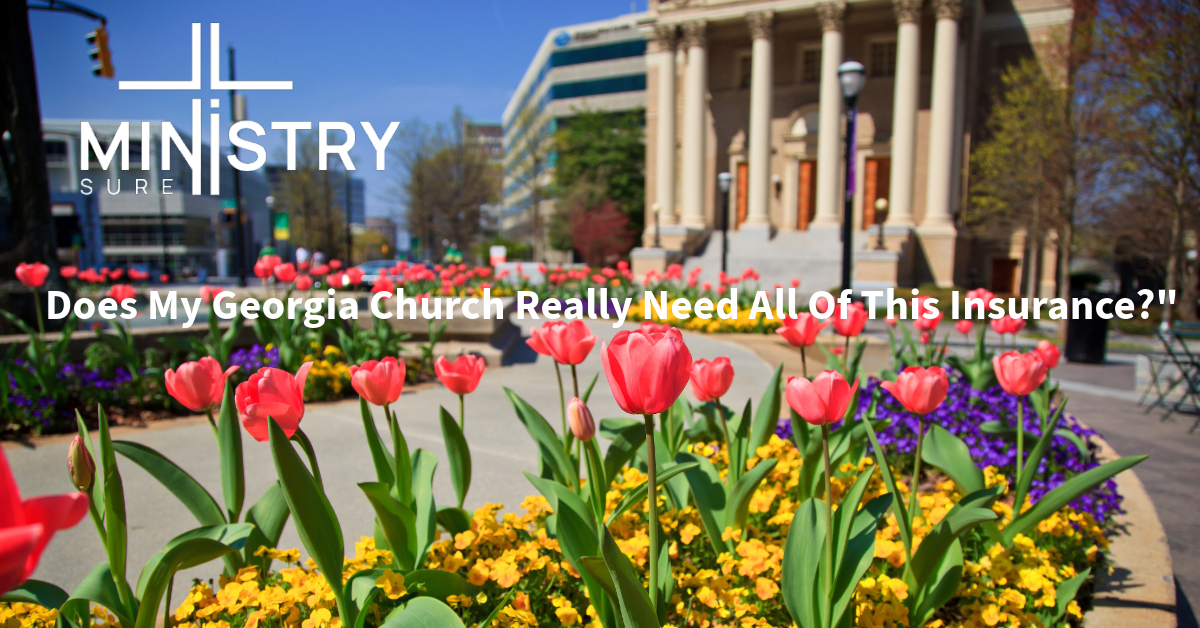One stormy Sunday, a small church in rural Georgia experienced a life-changing event. As the congregation gathered for morning service, a sudden tornado tore through the town, leaving a trail of destruction. The church’s roof was severely damaged, windows shattered, and valuable equipment inside was ruined. The aftermath left the community in shock, facing not only the physical damage but also the financial burden of repairs. Without proper insurance, the church would have struggled to recover, possibly even closing its doors permanently. This real-life scenario shows why having good insurance coverage is so important. It’s a good thing the church decision makers answered yes to the question, “Does My Georgia Church Really Need All Of This Insurance?”
Understanding Church Insurance Coverage
Churches face many risks that can threaten their operations, finances, and the well-being of their congregants and staff. Ensuring that your Georgia church has the right insurance is not about spending extra money; it’s about protecting the ministry and giving peace of mind to church leaders and the congregation alike. Just as a shepherd guards the flock, so must a church protect its assets and people from unpredictable incidents.
Insurance policies for churches can include protections from property damage to liability coverage, and even specific issues like sewer and drain backups, employee dishonesty, and equipment breakdowns. Churches face unique risks—special artwork, the communal nature of services, and the wide range of activities they provide can all give rise to unexpected challenges. A tailored church insurance policy, crafted to meet the specific needs and budget of your religious organization, is essential.
Commercial Property Insurance
Commercial property insurance is crucial for protecting your Georgia church against many dangers, including weather-related damage, equipment breakdown, and even food contamination or sewer water backup. This coverage ensures that real and personal property, from stained glass windows to pipe organs and pews, is protected.
Consider that everything within the church premises, including computer equipment, communication systems, and cherished library property, falls under what can be secured through commercial property insurance. The financial hardship that can follow in the wake of damage or loss to the building or its treasured contents is a compelling reason for securing adequate commercial property insurance. Engaging a knowledgeable independent insurance agent can help customize this insurance to your church’s current needs and budget, further reinforcing the foundation of its financial stability.

General Liability Insurance
General liability insurance is essential for a church. If a visitor slips on a wet floor during a service or a volunteer damages a member’s car while helping to manage the parking lot, general liability insurance aims to cover these types of incidents. Larger churches, especially, may find themselves hosting many events that increase their exposure to risks. With liability insurance, congregants and leaders alike can rest assured that medical expenses, legal costs, and other damages that may arise are taken care of.
It’s not merely about mitigating risks but also about upholding the trust that congregants place in their church. And with the societal increase in allegations of misconduct or wrongful termination, a church without comprehensive general liability insurance might find itself facing considerable financial and reputational distress. This insurance is key to maintaining the trust and operational integrity of any faith-based institution.
Workers’ Compensation Insurance
Workers’ compensation insurance ensures that employees who might suffer an injury or illness while performing their duties are covered. Whether it is a maintenance worker who incurs an injury while setting up for a special event or an office staff member who develops a repetitive strain injury, workers’ compensation insurance stands as an essential pillar of employee health benefits.
A church that secures workers’ compensation insurance shows a powerful message of care and responsibility towards its employees. Moreover, in the event of medical expenses or the need for recovery time, this can shield the church from severe financial hardship and legal complications. With specialized products and expert counsel available, there’s clear guidance at hand to navigate the intricacies of this insurance.
Determining Insurance Needs for Your Church
When exploring the many policies available, it’s essential to weigh the nuances of insurance with the unique needs of your congregation. Whether you’re in the heart of Georgia or its suburbs, your sacred space calls for protection beyond the physical structure. A church is more than brick and mortar; it is a community hub, a place of solace, and a beacon for gatherings.
To fully protect your ministry, it’s necessary to consider a full spectrum of insurance products. From coverage for employees to potential risks involving the congregation and property, your church’s insurance strategy should be as robust and multifaceted as your ministry itself.
Assessing Church Property and Assets
As stewards of your church’s resources, you must account for every asset under your care. Real estate, from worship halls to annex buildings, demands commercial property insurance to aid in recovery from unanticipated damage or loss.
Beyond structures, take a careful inventory of your church’s possessions—audio-visual equipment, musical instruments, and even external defibrillators—any and all personal property that supports your ministry’s operations.
Assessing Potential Risks and Liabilities
Your Georgia church isn’t merely a spiritual retreat; it’s also a public space where numerous activities unfold. Alongside worship services, you may host summer camps, offer counseling sessions, and partake in community outreach—all of which carry inherent risks.
It’s important to evaluate liability insurance to shield your ministry from claims of injury on your premises. Consider the unthinkable yet possible occurrences: allegations of misconduct, wrongful termination, or other sensitive legal issues that could arise. Tailored policies can provide not just financial relief but also peace of mind.
Understanding Coverage Limits
When choosing insurance for your Georgia church, understanding coverage limits is crucial. These limits define the maximum amount an insurance company will pay out for a claim within a specific period. While it can be tempting to choose lower limits to save on insurance costs, this decision could leave your church financially exposed in the event of significant claims.
Coverage limits should align with your church’s unique potential risks and the value of its assets. Here are key points to consider:
- Liability Insurance: Helps protect against claims of bodily injury, property damage, and issues like wrongful termination or misconduct.
- Commercial Property Insurance: Covers building and personal property damage or loss.
- Workers’ Compensation Insurance Coverage: Mandatory in many states, it covers employees’ medical expenses and a portion of lost wages if they get injured on the job.
- Life Insurance and Health Benefits: Provide support to employees and their families, which can include Christian health insurance options.
An independent insurance agent can help evaluate appropriate limits, ensuring your church has comprehensive coverage without overpaying. Well-chosen coverage limits contribute to peace of mind and can prevent financial hardship.
Considering Potential Lawsuits and Claims
When considering the necessity of insurance for your Georgia church, it’s essential to acknowledge the reality of potential lawsuits and claims. Church leaders, striving to hold a sanctuary of peace, cannot overstate the importance of safeguarding their congregation and assets against unforeseeable legal issues. Legal turmoil could range from allegations of misconduct or wrongful termination to injuries on church property that result in hefty medical expenses.
Liability insurance becomes a shield during such times, protecting from claims that could otherwise lead to crippling financial hardship. Take for instance an incident within the church requiring immediate medical intervention; access to external defibrillators could mean life or death, but also implies potential liability for the church.
The costs linked with defending against claims, even if unfounded, can quash a ministry’s finances. Hence, opting for comprehensive coverage through trusted providers who tailor insurance products specifically for faith-based organizations, is a prudent decision. Including personal property and commercial property insurance, backed by health insurance and life insurance, delivers a robust financial safety net.
Consulting with Insurance Professionals
The complexities of church insurance require tailored advice from professionals who understand the specific needs of religious organizations. Consulting with insurance professionals, particularly those who specialize in church coverage, can help decode the nuances of insurance products.
These consultants can provide insights into:
- What coverage types are most beneficial for your church’s size and activities.
- How to balance insurance costs while still maintaining comprehensive coverage.
- Strategies for minimizing risk, which can, in turn, affect insurance premiums.
An effective consultation should yield a clear roadmap for church leaders, outlining policies that encompass the full scope of church activities and assets. This includes specialized coverages, such as directors and officers insurance or vehicles owned by the church. Whether you’re a new church plant or an established congregation, the knowledge of a dedicated insurance professional is invaluable in safeguarding your ministry’s future.
MinistrySure helps religious and non-profit organizations in Georgia find the right insurance coverage tailored to their specific needs. Our expertise ensures that your church is well-protected, allowing you to focus on your mission with confidence. Contact us today to put together a protection plan for your ministry/organization.






